- News
- Reviews
- Bikes
- Components
- Bar tape & grips
- Bottom brackets
- Brake & gear cables
- Brake & STI levers
- Brake pads & spares
- Brakes
- Cassettes & freewheels
- Chains
- Chainsets & chainrings
- Derailleurs - front
- Derailleurs - rear
- Forks
- Gear levers & shifters
- Groupsets
- Handlebars & extensions
- Headsets
- Hubs
- Inner tubes
- Pedals
- Quick releases & skewers
- Saddles
- Seatposts
- Stems
- Wheels
- Tyres
- Tubeless valves
- Accessories
- Accessories - misc
- Computer mounts
- Bags
- Bar ends
- Bike bags & cases
- Bottle cages
- Bottles
- Cameras
- Car racks
- Child seats
- Computers
- Glasses
- GPS units
- Helmets
- Lights - front
- Lights - rear
- Lights - sets
- Locks
- Mirrors
- Mudguards
- Racks
- Pumps & CO2 inflators
- Puncture kits
- Reflectives
- Smart watches
- Stands and racks
- Trailers
- Clothing
- Health, fitness and nutrition
- Tools and workshop
- Miscellaneous
- Buyers Guides
- Features
- Forum
- Recommends
- Podcast
review
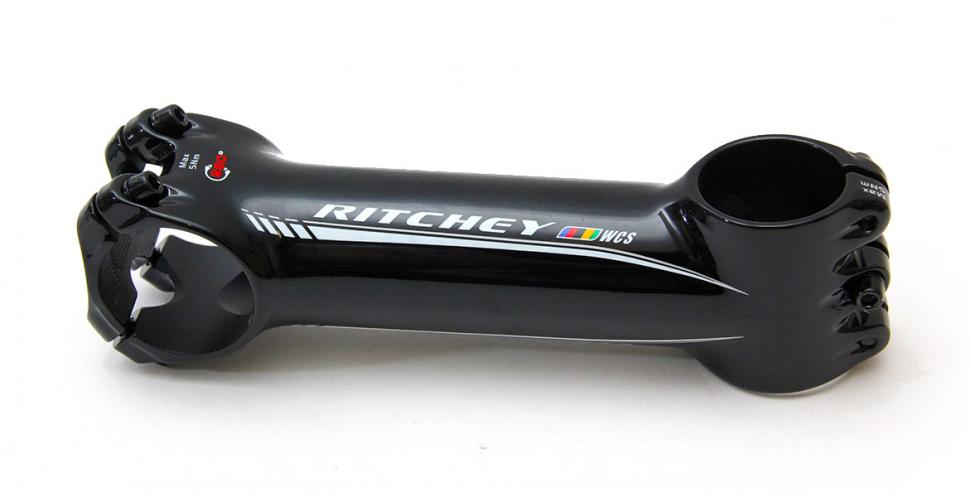 Ritchey WCS C260 stem
Ritchey WCS C260 stem£80.00
VERDICT:
A very light and great looking stem that is impressively stiff considering its lack of weight
Weight:
115g
Contact:
www.paligap.cc
At road.cc every product is thoroughly tested for as long as it takes to get a proper insight into how well it works. Our reviewers are experienced cyclists that we trust to be objective. While we strive to ensure that opinions expressed are backed up by facts, reviews are by their nature an informed opinion, not a definitive verdict. We don't intentionally try to break anything (except locks) but we do try to look for weak points in any design. The overall score is not just an average of the other scores: it reflects both a product's function and value – with value determined by how a product compares with items of similar spec, quality, and price.
What the road.cc scores meanGood scores are more common than bad, because fortunately good products are more common than bad.
- Exceptional
- Excellent
- Very Good
- Good
- Quite good
- Average
- Not so good
- Poor
- Bad
- Appalling
Ritchey's WCS C260° stem is the company's lightest aluminium offering and uses a unique handlebar clamp with more of the stem wrapping around the bar.
The most interesting, and novel, part of the stem is the 260 degree handlebar clamp. Usually a stem and its matching face plate each have a 180 degree wrap around the bars. The Ritchey stem wraps 260 degrees around the bar, and is fixed to the smaller face plate with four angled 3mm Allen bolts. The design is claimed to produce a more even clamping force on the bars and also contributes to the lightness.
Care needs to be taken when tightening the 3mm Allen bolts used across the stem, three at the steerer clamp (with an angled slot) and four at the front. They're made from steel - I would have expected titanium in a stem of this weight – with their small size there's a definite risk of rounding them off if you're a little ham fisted. I would seriously recommend investing in a torque wrench and following the recommended torque settings. It's a little more fiddly to fit tighten the lower bolts, a ball-ended Allen tool helps a lot here.
The stem is 3D forged from 7075 aluminium and its svelte looks suggest that as much excess material as possible has been machined away. The unique clamp design allows smaller, lighter bolts to be used.
Stems don't get much lighter than this; 115g for the 120mm stem I tested. Even carbon bars don't get this light. Furthermore, Ritchey claim it's significantly lighter than their previous stem designs while still managing to be stiffer.
So you're probably wondering how I got on with it then aren't you? After several months of testing on my Cannondale Evo long-termer now, I can say I've been very impressed. I'll admit that I've always preferred aluminium stems, taking any weight penalty in return for the extra stiffness they usually deliver at the light end of the scale. There's no weight penalty with this stem, and it's every bit as stiff as they claim. In fact it highlighted flex in the handlebar I fitted to it.
As for the advantages of the handlebar clamp, well that is harder to identify over a regular stem in road testing. The clamping area, once the bolts are done up, is the same as a standard stem, so I'm not sure it makes much difference where the split in the two clamping surfaces is once all the bolts are tightened up.
I love the 'wet black' finish that Ritchey offer (a wet white, wet red and standard finish also available) that lifts its appearance well above that of other aluminium stems. It almost looks carbon from a distance. Very pleasing to the eye.
Verdict
Very light and great looking stem that is impressively stiff considering its lack of weight.
road.cc test report
Make and model: Ritchey WCS C260° stem
Size tested: 120mm, 6/84°, wet black
Tell us what the product is for, and who it's aimed at. What do the manufacturers say about it? How does that compare to your own feelings about it?
This revolutionary patented design starts with a bar clamp that wraps a full 260 degrees around the handlebar to distribute clamping stress more evenly through the handlebar, faceplate, hardware and stem body. The steer tube clamp uses three bolts and a curved slot to reduce clamp stress on the steer tube.
Tell us some more about the technical aspects of the product?
3D forged and internally machined 7050 alloy body
4 x M4 faceplate bolts and patented 260 degree bar clamp design reduces weight, increases stiffness and distributes stress more evenly
3 x M4 steer tube bolts and curved clamp slot reduces weight and steer tube stress
5Nm torque max on all hardware, same as 4Axis stems using M5 bolts
30% stiffer than Ritchey's legendary WCS 4Axis and 20 grams lighter
Fits most road and mountain bars
Rate the product for quality of construction:
8/10
Rate the product for performance:
7/10
The 3mm Allen bolts require a delicate touch, or use of a torque wrench to avoid potential rounding of the bolt.
Rate the product for durability:
6/10
Rate the product for weight, if applicable:
7/10
It's very stiff so there's not a hint of flex or give, but it's solid and secure over rough roads and hitting the occasional pot hole.
Rate the product for comfort, if applicable:
7/10
Rate the product for value:
6/10
It's the higher end of the pricing spectrum for aluminium stems but it's cheaper than heavier carbon stems.
Tell us what you particularly liked about the product
The wet black finish gives it a very pricey look.
Tell us what you particularly disliked about the product
The 3mm Allen bolts.
Did you enjoy using the product? Yes.
Would you consider buying the product? Yes.
Would you recommend the product to a friend? Yes.
About the tester
Age: 31 Height: 180 Weight: 67
I usually ride: My best bike is:
I've been riding for: 10-20 years I ride: Every day I would class myself as: Expert
I regularly do the following types of riding: road racing, time trialling, cyclo cross, commuting, touring, mtb,
David worked on the road.cc tech team from 2012-2020. Previously he was editor of Bikemagic.com and before that staff writer at RCUK. He's a seasoned cyclist of all disciplines, from road to mountain biking, touring to cyclo-cross, he only wishes he had time to ride them all. He's mildly competitive, though he'll never admit it, and is a frequent road racer but is too lazy to do really well. He currently resides in the Cotswolds, and you can now find him over on his own YouTube channel David Arthur - Just Ride Bikes.
Latest Comments
- belugabob 1 hour 40 min ago
Because the number of 40% tax payers buying downhill bikes on the scheme, whilst lower rate tax payers (who are more likely to actually cycle to...
- TheBillder 1 hour 43 min ago
The spokes and nipples are not anodised for environmental reasons, but the rims are. Which is a lot more metal. Hmm...
- Zebulebu 2 hours 15 min ago
Yeah, they'll be great after being crushed in your jersey pocket for three hours. ...
- Rendel Harris 2 hours 22 min ago
I'm afraid so, anything operated by TfL apart from the Woolwich ferry and the Silvertown Tunnel bike bus when it opens next month.
- Backladder 3 hours 30 min ago
Its only "meh" because we all experience similar passes every ride, I'm sure if they got their finger out and worked out the distance it would be...
- Global Nomad 3 hours 31 min ago
have (had) both generations of Empire and loved their fit, so hoping the update keeps the same shape/last. Hope they're going to have a good range...
- Miller 3 hours 42 min ago
Hadn't heard of this. Very uncomfortable echoes of the death of Muriel Furrer at the Worlds.
- dodgy 3 hours 48 min ago
"It is worth mentioning, though, that there were a few occasions where the second light wouldn't act as it was meant to" <-- I'm out....
- NR23Derek 4 hours 18 min ago
I asked an FoI about this and no WCHR assesment was done. The planning permission was given in 2012 by South Norfolk DC asthe hospital is just...
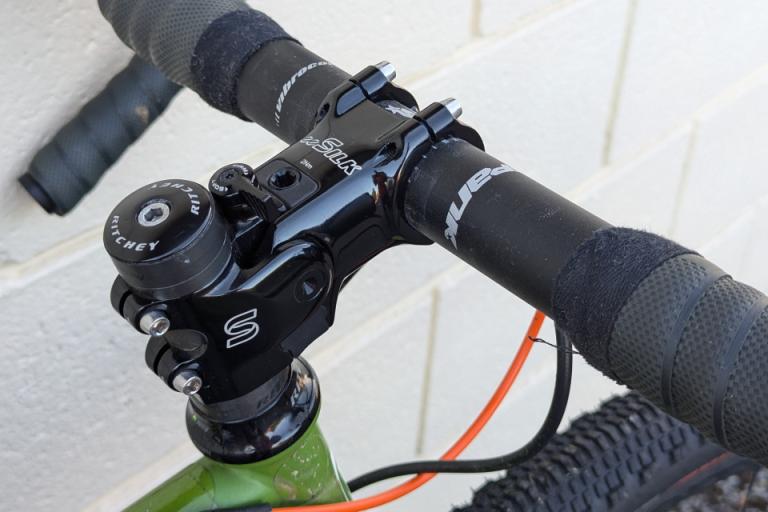
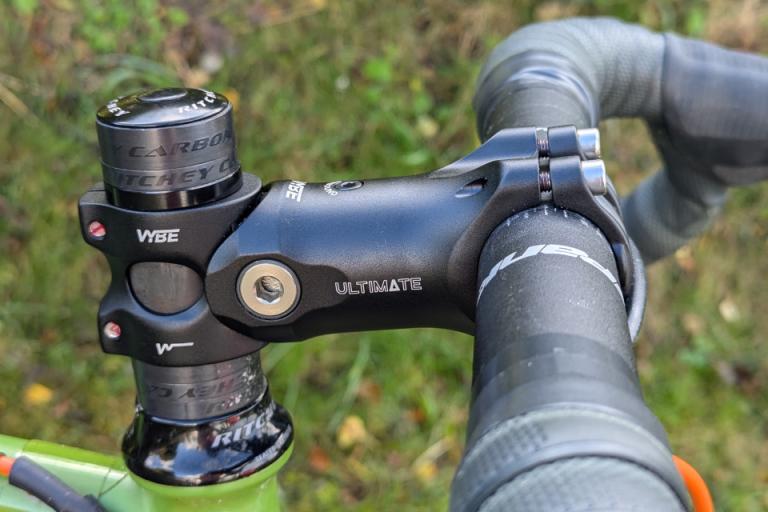
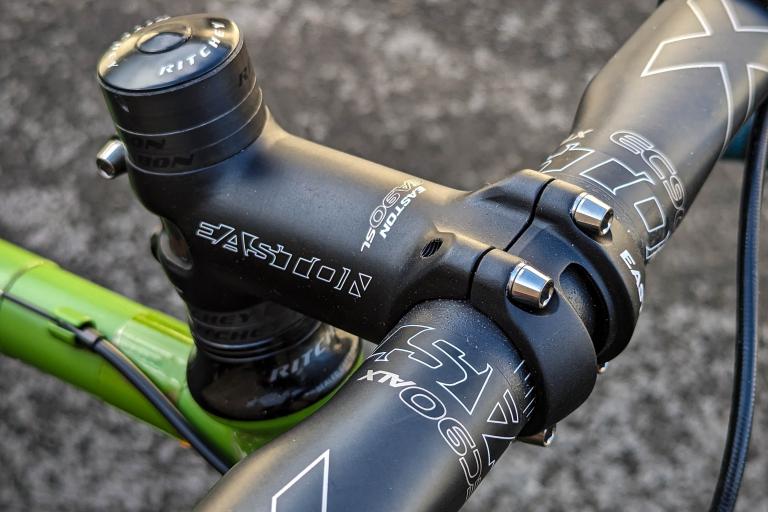
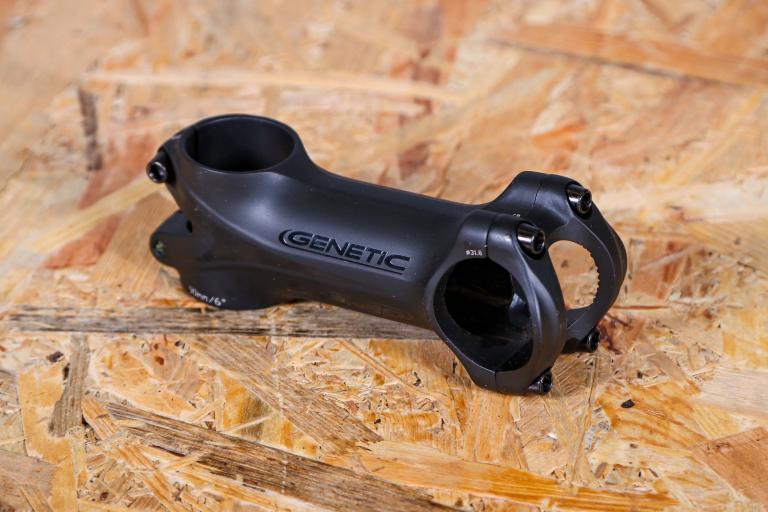
Add new comment
7 comments
Now that we are not suppose to tighten anything with more than 5Nm anyway, I actually think it's a great idea to use more 3 mm Allen bolts on components. Case in point, bought a new Thomson X2 stem a few months and everything was 3 mm as oppose to the 4 mm on my older Thomson stems. With a normal 3 mm L-shaped Allen key the key itself started to bend before I could overtighten the bolts. No need to take out the torque wrench. Same thing on Avid Shorty Ultimate brakes, all the screws are tiny and its pretty much impossible to overtighten things with normal Allen keys.
My problem with this stem is that the bolts are 3mm and seem to be pretty soft. It's also quite tricky to get my Halfords 3mm 3/8th drive sockets at work to fit properly because of where the bolts go.
you simply slide it over the smaller section of the bar either side of the 31.8mm section and slide it into place.
no need to remove tape/shifters.
Suppose it might depend on your bars but I'm using Ritchey's own Evo Curves & Logic II's and I've found what you're describing isn't possible with either.
.
I like Ritchey a lot, but this clamp system is dumb.
The 260 degree nature of it makes it much more fiddly to fit and remove than a standard 180, you have to slide the stem onto the bars at the bottom of the drops or the start of the top curve so you have to remove your shifters and bar tape if you ever want to change your stem. Revolutionary no, impractical yes.
"Ritchey claim it's significantly lighter than their previous stem designs while still managing to be lighter."
I should hope so too